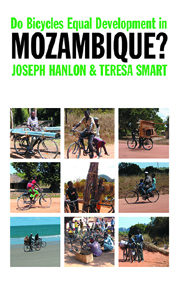Book contents
- Frontmatter
- Contents
- Acknowledgements
- The authors
- Money & measurements
- Abbreviations, acronyms & glossary
- Part I IS THERE DEVELOPMENT IN MOZAMBIQUE?
- 1 Introduction: more bicycles, but …
- 2 A brief history: war, peace & slow recovery
- 3 Can peasants pull Nampula out of poverty?
- 4 The Manica miracle is over
- 5 Cashew: from disaster to export model
- 6 Tobacco: hard choices
- 7 Has poverty decreased?
- 8 Is there development in Mozambique?
- Part II ACTORS & CONTEXT
- Part III ALTERNATIVES & THE DEVELOPMENTAL STATE
- Appendix 1 Aid
- Appendix 2 Investment & other tables
- Bibliography
- Index
8 - Is there development in Mozambique?
from Part I - IS THERE DEVELOPMENT IN MOZAMBIQUE?
Published online by Cambridge University Press: 05 April 2013
- Frontmatter
- Contents
- Acknowledgements
- The authors
- Money & measurements
- Abbreviations, acronyms & glossary
- Part I IS THERE DEVELOPMENT IN MOZAMBIQUE?
- 1 Introduction: more bicycles, but …
- 2 A brief history: war, peace & slow recovery
- 3 Can peasants pull Nampula out of poverty?
- 4 The Manica miracle is over
- 5 Cashew: from disaster to export model
- 6 Tobacco: hard choices
- 7 Has poverty decreased?
- 8 Is there development in Mozambique?
- Part II ACTORS & CONTEXT
- Part III ALTERNATIVES & THE DEVELOPMENTAL STATE
- Appendix 1 Aid
- Appendix 2 Investment & other tables
- Bibliography
- Index
Summary
Most Mozambicans are still desperately poor, and raising incomes is the most important developmental objective. But in this chapter we want to look beyond cash, at wider issues of poverty and development, and how Mozambicans are doing against those standards. First, we consider two approaches, one based on rights and the other on children and the Millennium Development Goals (MDGs). Next, we look more broadly at development as a process of change. That leads to considerations of social services such as health, education and water supply, and to questions about power and the extent to which Mozambicans are taking control of their own development process.
The Universal Declaration of Human Rights, adopted by the United Nations on 10 December 1948, includes the basic freedoms: ‘the right to freedom of opinion and expression’ (Art. 19); ‘the right to freedom of peaceful assembly and association’ (Art. 20); ‘the right to take part in the government of the country, directly or through freely chosen representatives; the right of equal access to public services; and the will of the people to be the basis of the authority of government … expressed in periodic and genuine elections which shall be by universal and equal suffrage and shall be held by secret vote or by equivalent free voting procedures’ (Art. 21).
- Type
- Chapter
- Information
- Do Bicycles Equal Development in Mozambique? , pp. 71 - 86Publisher: Boydell & BrewerPrint publication year: 2008

